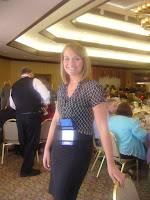 Sorry for the delay but here it is your Ask The Agent for this week.
Sorry for the delay but here it is your Ask The Agent for this week.If a manuscript is queried as belonging to one genre, but after reading the partial, you feel it belongs to another, what would you do?
This is something that actually happens more often than one would think. One big piece of advice I give to writers who ask me about query letters is to make sure they are familiar with what they are writing. This also ties directly into being familiar with the market that you are writing in.
The short answer to this question is if it is a good story and the writing is strong and sellable I don’t care if it was “mislabeled” – “I’ll say to the writer, hey you may think you have that, but in fact you have this, now here’s what we can do with it to get it sold!”
Now that I’ve said that, I’m going to mention several of the ways authors shoot themselves in the foot by not knowing what they write. They have a great story but they send it to an agent that doesn’t represent the genre that the story falls in. They pitch it to an editor who falls in love with it but isn’t able to acquire a manuscript that is outside of their line. In both instances not only is the author wasting valuable time, but they are perhaps ruining their chances with someone else in an agency/house that may be the perfect candidate to acquire the project.
Also, if one doesn’t know the real genre that their story fits in how can they be aware of the market demands for that genre? Yes, it is true that everyday someone says “bring us something fresh and different”, however, it has to fit within certain parameters to be able to market the title correctly to an interested audience. ::And here I will insert my weekly disclaimer, yes, there are exceptions to everything I’m saying. Please don’t tell me “well I know so and so who sold Title X and it didn’t follow any of the rules”:: It is invaluable for an author to be informed about genre rules: word counts, POV standards, plot structure, primary characters, secondary characters, plots, secondary plots, conflict, etc etc.
Every genre is a little bit different and what works clearly in one does not always work in another. I don’t care how good your paranormal world is, if it takes you 200k words to build there is little I can do to sell it. You may have the best romantic suspense in the world, but if I don’t meet the hero until page 200 its not going to be what the romantic suspense editors are wanting to see.
In light of all these things if I see an author who is blatantly pitching their work as something that its not I will usually point out their error and explain the reasons that I feel it is something else. Then if it is something that I am interested in, I will work with them to get the novel up to the standards of its true market. I will spend time educating and referring the author to sources that will help them understand wherein lies their error and how to correct the problem or avoid it in the future.
As a final thought, and this ties to several of the other questions that I’ve seem posted on the thread and I may go into deeper in a future question. Don’t try to be sneaky. Lets use Chick-lit as an example – If you have a story that is no-questions-asked chick-lit, call it what it is. I know it’s a tough market, but trying to disguise the story as something else isn’t going to make it sell any quicker. If it quacks like a duck and looks like a duck, it is a duck – you aren’t going to be fooling anyone. Editors and agents read all day, every day in the genres they represent – they are going to know within pages if someone is trying to “trick” them into reading, and they aren’t going to be impressed. As a professional in the industry you are to present your project honestly and accurately.
So take the time to know your stuff, educate yourself on the market, and familiarize yourself with your competition. IF you think you are writing women’s fiction, take some time and read the most praised best women’s fiction writers, read the bestsellers, read what people are saying. Then sit down and honestly look at your work and see if it fits the pattern of all the other examples you are seeing on the shelves
Thanks so much Elaine. Please be sure to post your new questions in the comments section. See ya next week!
Best,
Kwana
PS- Scroll down for more fun.
































4 comments:
Ack. The dreaded chick lit label. Granted, chick lit is an almost impossible sale right now. My problem is that many agents/editors (not saying you!) lump everything with a chick lit voice together in one pot. Take me, for example (please! LOL). I write in first person and my heroines have a snarky voice but the resemblance to chick lit stops there. In one, the focus is on the romance and in the other it's on the mystery. Both have HEA's, and if I mention a designer it's to show the heroine wouldn't know a Jimmy Choo from a choo-choo. So, okay. I call one "humorous women's fiction" and the other "humorous romantic mystery." Am I dooming my chances from the get-go by writing with what's known as a chick lit voice?
Damn I'll have to take the kookaburra feathers off my duck, he couldn't sing anyway so I guess that kills that idea.
I'm still learning all the sub genres, do you ever get confused as to where things fit? Or are you an avid reader that knows every nuance needed for categories?
As for myself I'm writing all over the shop, first is a romance set in WW2, second a Scifi, third thriller... when you contract an author do you allow them scope to branch out into other genres or do you ask them to stick with what they know works for a few books?
Oh and what do you do with a book that an author can't sell? David B Coe posed this question about a book he thinks is the best thing he's ever written but it won't sell.
Sorry for soo many questions this week, I'll curb it next week I promise.
Thanks for the questions Randy and Natalie I'll put them in line for Elaine.
Great post, Kwana!
Okay, here's my question:
I am currently the author of three published (or soon to be published) nonfiction books, but I am now looking for an agent for my finished novel. I sold the 3 NF books without an agent, and would love to get someone who handles both--but it isn't a prerequisite.
Should I say somewhere on my query that I am interested in possible representation for the nonfiction, too? Or will the agents figure that out from the books being listed in the bio section and ask about the NF if they are interested?
Thanks, Deborah Blake
Post a Comment